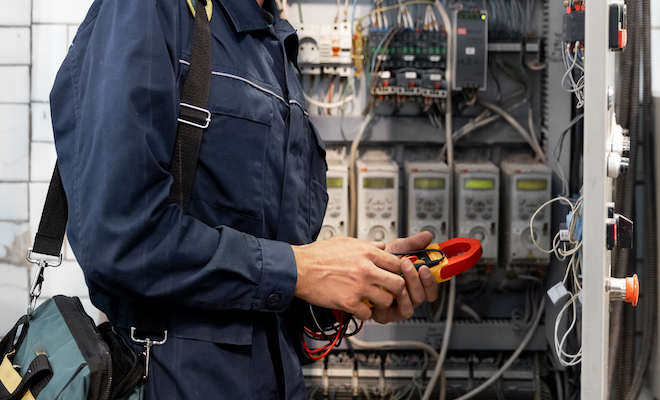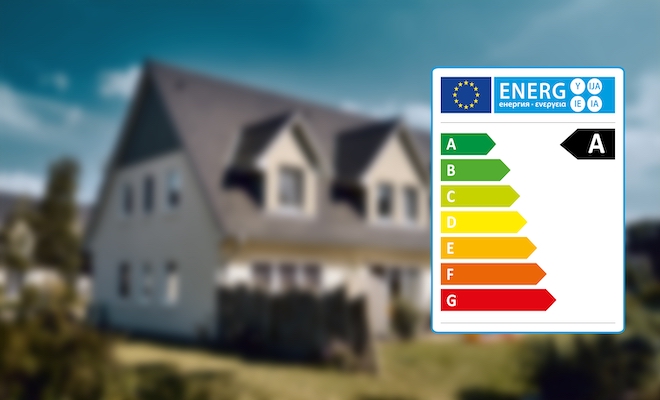EPC Surveyor Costs
Last updated 27th February, 2024
Wondering what it costs to have an EPC assessor to your home?
This EPC certificate cost guide breaks it all down for you including what the energy assessor does, EPC prices and more!
Let's begin!!

How Much Does An EPC Cost?
Are you looking for an EPC assessor but not sure about how much it will cost you?
The average cost of an EPC Assessor is normally around £15 to £25 per hour or £90 to £120 per day.
The cost of an EPC includes the survey conducted by a certified Domestic Energy Assessor as well as the Energy Performance Certificate. The Certificate rates the property's energy efficiency on a scale of A to G, with A indicating "Very Efficient" and G indicating "Not Very Efficient." In England and Wales, the average energy efficiency rating for a property is band D.
The EPC will also assign a rating to the property ranging from 1 to 100, with a higher number indicating greater energy efficiency. Fuel bills will be lower if your home is more energy-efficient. Therefore, getting an EPC assessor is the better option as they can improve your home, and they are only needed around every ten years, so you probably won't need another one.

To find out more about what EPC assessors do and how much they charge, take a look at the following guide, which will break down everything you need to know.
We will also go over the qualifications and insurance an EPC assessor needs. Therefore, if you are moving homes and want the process to be easy and find the perfect EPC assessor for an affordable price, then this article will help you on your journey of finding the perfect one.
An EPC is meant to provide information about a building's energy performance to potential purchasers or tenants so that they can consider energy efficiency as part of their investment or business decision to buy or occupy that property. An EPC assessor job does not affect the cost of the overall assessment. However, they can include different roles and what is expected from them.
Table of Contents
EPC Assessor
You'll need an Energy Performance Certificate whether you're selling a house, putting it up for rent, or even if you've built a house from the ground up (EPC). A professional Domestic Energy Assessor (DEA) issues this certificate, which establishes your home's energy efficiency rating. Before the property is put on the market, EPCs must be ordered.
The EPC assessor will need access to all rooms in the house, including the loft hatch, room in the roof, expansions, conservatory, and electric and gas metres (if applicable).

They'll make a rough sketch of the property's overall floor plan. After that, they'll go around each room, taking precise measurements and recording all pertinent information:
- Property type and age
- Materials for construction
- Insulate your home
- The thickness of the walls
- Controls and heating systems
- Details on the hot water cylinder
- Insulation for water cylinders
- Heating systems used as a backup (if applicable)
- constructing a floor
- Type of window glazing
- Lighting, particularly if you're utilising energy-efficient light bulbs.
The EPC assessor will then calculate and produce your EPC Certificate after they have completed the survey. They will also take advice on how to increase the energy efficiency of your home.
The EPC certificate is then uploaded to the EPC Register, and you will receive an email copy of the report. On the EPC Register, you can always see a copy of your EPC certificate.
Commercial EPC Assessor
Commercial energy assessors evaluate commercial buildings' energy efficiency and provide Non-Domestic Energy Performance Certificates. Performing extensive inspections of properties and collecting information on the age, number of floors, and building type, as well as measuring the number and size of rooms and windows, would be part of the job.

The ability to detect heating systems is critical since it has a significant impact on the energy rating. They will then record the information on a computer system to generate an energy efficiency rating and an Energy Performance Certificate at the end of the day (EPC) working conditions. Commercial EPC assessors will also advise businesses on reducing energy usage and saving money in the long run.
NDEAs
A Non-Domestic Energy Assessor (NDEA) is a person who has been accredited by the government. Conducting an energy assessment, creating an EPC, and filing the EPC with their accreditation system are all tasks that energy assessors are accountable for.

Government-approved accreditation schemes ensure that energy assessors are qualified and have the necessary skills to conduct energy assessments, ensuring the quality of energy assessments and EPCs.
Energy assessors must be certified in the type of building being evaluated.
The different levels of an energy assessor include:
- Level 3: Simple, existing non-dwellings tiny structures such as converted houses or doctors' offices.
- Level 4: Non-dwellings, both new and existing: for example, modest purpose-built office buildings.
- Level 5: Complex non-dwellings, both new and existing: enormous office buildings or industries.
There are two ways to determine whether an energy assessor is a member of a certification scheme:
- Check your energy assessor's credentials on the Non-Domestic EPC Register, which maintains a nationwide database of accredited energy assessors. This allows you to conduct a search based on the name of the energy assessor or the membership number of the accreditation system.
- Inquire about the accreditation scheme that your energy assessor belongs to (and their membership number). Your energy assessor's accreditation to practise as an energy assessor can be verified through the accreditation process.
Cracks in the floors and around skirting boards
As a house settle,s cracks can appear in the floorboards or along the skirting boards, inviting an unwanted draught into the property.

Floorboards and skirting boards are typically addressed in the same manner; the gaps are located and then filled with a flexible material, such as silicone mastic or decorators caulk. This will stop the draught penetrating the home and, as it is flexible, allows for house movement without the risk of the seal being broken like you may expect with a brittle material.
EPC Assessor Hourly Rate
In the United Kingdom, the average hourly rate for a domestic energy assessor is around £14 per hour.
The cost of an EPC will vary depending on the following factors:
- The size of your property
- Its location
- The type of building
For example, an EPC for a large house in London will likely cost far more than an EPC for a one-bedroom unit in Grimsby. Many individuals obtain an EPC from their estate agent because it is a convenient choice, but it may end up costing you more in the long run.
EPC assessors also vary their price depending on how many hours a day they work, as some jobs can take longer than others. Therefore, if your building is slightly different, the EPC assessor cost per hour might increase as the assessor is taking more time than usual to make sure it is perfect for you.
The table below sets out the average price of different areas in the UK:
| Location | Cost Per Hour |
|---|---|
| North-west | £15-£20 |
| North-east | £17-£20 |
| South-west | £13-£17 |
| South-east | £20-£25 |
EPC Assessor Daily Rate
EPC Assessor typically charges a daily rate of around £90. The daily rate varies based on where you live. The size of the property will also determine the cost; for example, a larger building will take longer to assess.
EPCs can cost up to £120, though most houses will cost far less if they are just an average-sized house with easy property. While all homes must have an EPC before being sold or rented, there is no value in going with the most expensive provider, so look around for the best bargain. It is often less expensive to hire a residential energy assessor directly rather than through an estate agent as they often give you more expensive options.
The below table sets out the daily rate for EPC assessors:
| Location | Cost Per Day |
|---|---|
| North-west | £90-£100 |
| North-east | £90-£95 |
| South-west | £110-120 |
| South-east | £110-£120 |
EPC Assessor Qualifications
Energy assessors should have a current energy inspection qualification. This is part of a National Occupational Standard in Energy Inspection and will demonstrate technical proficiency to provide a certificate. The Qualifications and Curriculum Agency has approved the qualification. Qualification bodies have created assessment processes that are aligned with the National Occupational Standard.
Specific areas of energy inspection may be covered by the qualifications offered. The energy assessor may only conduct inspections in areas covered by their current qualification and accreditation system. Having qualifications is the best option as it straight away creates trust between the client and the assessor.
The qualifications granted may be restricted in other ways (for example, the qualification may only remain valid for a certain number of years or may require the energy assessor to be supervised in some way during a probationary period). Only within these constraints will the energy assessor be able to conduct inspections.

To safeguard customers, certificates must only be issued by assessors who are "suitably qualified" and competent. A 'suitably qualified' person has either a qualification or authorised prior experience and learning that is equivalent to the National Occupational Standard standards for the specific occupation for which they are seeking accreditation.
Key tasks connected to the new energy efficiency measures will be carried out by energy assessors. This will entail creating certificates and inspecting air conditioning systems, among other things.
An individual must be a member of an accreditation system to work as an energy assessor. A person's membership in such a scheme will only last if they meet the accreditation standards.
Accreditation programmes ensure that energy assessors are qualified and have the necessary abilities to undertake these evaluations. The energy assessor oversees conducting an energy assessment on your building with reasonable care and expertise, as well as providing an EPC and suggestion report. Before handing the certificate to the person who commissioned it, they must enrol it into the national register.
EPC Insurance
All qualified EPC assessors and clients must carry professional insurance and join a certified scheme for the safety and protection of energy assessors and clients. It shields energy assessors and home inspectors from the costs of resolving or contesting a client's claim that there is a flaw in the work they've done for them, such as a mistake in an EPC that they say prevented the sale of a home.

Most EPC assessors are covered by professional indemnity insurance, which protects against loss or damage if a client is unhappy with the services provided.
They should also have public liability insurance. This typically covers claimants' costs and defence costs in the event of accidental death, bodily injury to a third party, and/or loss or damage to tangible property to a third party during their business.
How to Find and Hire an EPC Assessor You Can Trust
When wanting an EPC, you can google ones near you. This will give you multiple options; however, how will you know which one to trust? Picking the right EPC assessor can be a task, as you want a reasonably priced, straight to the point assessor that will give you exactly what you want and need on your home.
Family/friend recommendations are often the best as they have had experience with the assessor, and you know that they will be good. Going online and looking for an EPC can be risky as they sometimes are not the best, and you don't know anything about them, so it is always a hit or miss.
However, to avoid this, it is best to research assessors or ask what type of insurance or work history they have done to make sure they are legit and won't waste your money.
A good EPC assessor will have:
- Engineering science and technology knowledge
- Analytical thinking skills to be thorough.
- Pay attention to detail analytical thinking skills to be thorough and pay attention to detail
- An understanding of building and construction.
Choosing the right energy assessor is critical for your EPC rating and the long-term success of your building management. It's not just about energy efficiency; it's also about the health of your company and its employees.
FAQs
1. Replace your light bulbs with LED bulbs.
2. Insulate the walls and the roof.
3. Invest in windows that are double or triple glazed.
4. Replace your old boiler with a more energy-efficient one.
5. Install a smart metre in your home.
Sources
https://www.energy-trust.co.uk/role-profile-commercial-energy-assessor-non-domestic-energy-advisor/
https://nationalcareers.service.gov.uk/job-profiles/commercial-energy-assessor
https://focus360energy.co.uk/what-does-an-epc-survey-involve/
https://www.gartside.co.uk/Mobile/What-Is-An-NDEA.html
https://hoa.org.uk/advice/guides-for-homeowners/i-am-selling/how-much-does-an-epc-cost/
https://www.reallymoving.com/energy-performance-certificates/guides/how-much-does-an-epc-cost
https://www.elmhurstenergy.co.uk/how-do-i-become-a-domestic-energy-assessor
https://www.finance-ni.gov.uk/articles/energy-assessors-and-accreditation-schemes
https://www.bre.co.uk/filelibrary/training/membersarea/Energy_Assessors_FAQs_Version3_CB_ammended120809.pdf
https://www.contractorcalculator.co.uk/professional_indemnity_insurance_energy_assessors.aspx
http://www.karsonsconsulting.com/blog/08052017081731-choosing-the-correct-energy-assessor-is-key-to-energy-efficiency-as-well-as-the-health-of-your-business-and-workforce/










